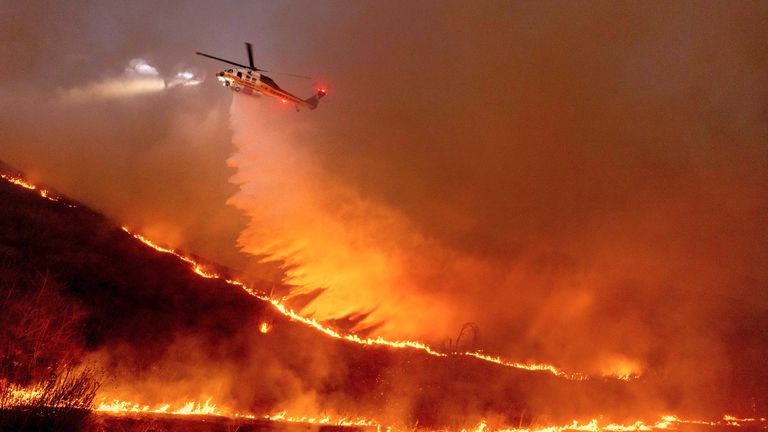
THE recent fires in Los Angeles serve as a stark reminder of the escalating impact of climate change on our planet.
As flames engulfed vast areas, communities were left to grapple with the devastation, witnessing not only the loss of homes and livelihoods but also the destruction of cherished landscapes and ecosystems.
The air filled with smoke, and the skies turned ominous, reflecting a growing crisis that has become all too familiar. This situation is not isolated; it mirrors the experiences of many regions worldwide, particularly in Africa, which has been predominantly labelled as "disaster-prone".
From droughts and floods to locust invasions and extreme weather events, African nations have faced a relentless barrage of challenges exacerbated by climate change. Yet, amid the chaos and destruction, there lies an opportunity for collective healing and action.
The Ubuntu philosophy, rooted in African culture, offers a powerful framework for navigating these turbulent times. Ubuntu emphasises our interconnectedness and shared humanity, reminding us that "I am because we are".
In the face of such calamities, this philosophy calls for a united response — encouraging us to come together, empathise with those suffering, and take meaningful steps towards change.
It urges us to recognise that our individual actions can contribute to a larger movement of solidarity and support, transcending borders and fostering a sense of global community. As we reflect on the fires in Los Angeles and the broader implications of climate change, we must embrace this opportunity to cultivate compassion, resilience, and collective action for a sustainable future.
The fires in Los Angeles are not merely a local issue; they are emblematic of a global crisis. Climate change has led to increased temperatures, prolonged droughts, and unpredictable weather patterns, creating a perfect storm for wildfires.
According to the National Interagency Fire Centre, wildfires have become more frequent and intense, with the western United States facing unprecedented fire seasons. These fires are a direct consequence of human actions — deforestation, carbon emissions, and urban expansion contribute to the environmental conditions that fuel these disasters.
As we witness the flames consuming homes, wildlife, and ecosystems, we must confront the reality that our actions have far-reaching consequences. The urgency to address climate change has never been more pressing.
Across the globe, Africa stands out as a continent that has been disproportionately affected by climate-related disasters. From droughts in the Sahel to floods in East Africa, the continent has faced a myriad of challenges exacerbated by climate change.
The Intergovernmental Panel on Climate Change (IPCC) reports that Africa is expected to experience more extreme weather events, threatening food security, health, and livelihoods. The term "disaster-prone" often oversimplifies the complexities of these situations.
While it acknowledges the frequency of disasters, it fails to capture the underlying issues — poverty, lack of infrastructure, and inadequate governance — that make these communities vulnerable.
The narrative of Africa as merely a victim of disasters needs to be re-framed. Instead, we must recognise the resilience and strength of African communities as they navigate these challenges.
In an era marked by division, it is crucial to recognise that all humans bleed red, united by our shared humanity. Climate change poses an existential threat that transcends borders, affecting everyone regardless of nationality or political affiliation.
From wildfires in California to floods in Bangladesh, the impacts of climate change are felt universally, making it clear that our struggles are interconnected. Geopolitical interests often hinder effective climate action, as nations prioritise short-term gains over long-term sustainability.
However, the urgency of this crisis demands collaboration rather than competition. By adopting a mindset that emphasises shared responsibility, we can work together to protect our planet for future generations.
Grassroots movements and international cooperation are essential in this fight. Education can raise awareness about our collective struggle, inspiring individuals to advocate for unified solutions. Additionally, technology must be accessible to all, ensuring that developing nations have the tools needed to combat climate change.
Ultimately, the youth are leading the charge, demanding accountability and action. As we confront the realities of climate change, let us set aside our differences and unite in this critical endeavour, fostering a spirit of empathy and solidarity for a sustainable future.
The time for action is now.
In the face of these natural disasters we face around the world, the Ubuntu philosophy offers a powerful framework for collective action. Originating from Southern Africa, Ubuntu emphasises the inter-connectedness of humanity: "I am because we are".
This philosophy reminds us that our fates are intertwined, and we must support one another in times of crisis. Adopting an Ubuntu approach means fostering empathy and understanding across borders.
The fires in Los Angeles should resonate with individuals in Africa and vice versa. When we see the destruction caused by climate change, we must recognise that these events are not isolated incidents; they are part of a larger narrative that affects us all.
Empathy is crucial in addressing the challenges posed by climate change. The fires in Los Angeles may feel distant for many, but they echo the struggles faced by communities in Africa dealing with droughts, floods, and other disasters.
By sharing stories and experiences, we can foster a sense of solidarity that transcends geographical boundaries. Social media platforms and global communication channels allow us to connect with those affected by disasters in real-time.
This interconnectedness can inspire action — whether it is fundraising for relief efforts, advocating for climate policies, or simply raising awareness about the shared challenges we face.
The Ubuntu philosophy encourages collaborative solutions to tackle the climate crisis. Governments, organisations, and individuals must work together to develop sustainable practices that address the root causes of climate change.
This includes transitioning to renewable energy sources, investing in sustainable agriculture, and implementing policies that prioritise environmental justice.
In Africa, local communities are already leading the way in innovative solutions to combat climate change
From reforestation projects to sustainable farming practices, these initiatives demonstrate the power of grassroots movements.
By supporting and amplifying these efforts, we can create a global network of change-makers committed to a sustainable future. Education plays a vital role in fostering an Ubuntu mindset.
By raising awareness about the impacts of climate change and the importance of collective action, we can empower individuals to make informed decisions.
Educational initiatives should focus on the inter-connectedness of global challenges, illustrating how local actions can have a ripple effect worldwide.
Schools, universities, and community organisations can serve as platforms for dialogue and learning. By incorporating climate education into curricula, we can equip future generations with the knowledge and skills needed to address the pressing issues of our time.
The fires in Los Angeles, alongside the myriad disasters faced by communities in Africa and beyond, serve as a clarion call for humanity to unite. The Ubuntu philosophy reminds us that we are stronger together.
As we navigate the complexities of climate change, we must foster empathy, collaboration, and a shared commitment to creating a sustainable future. In this moment of crisis, let us reflect on our shared humanity and recognise that the challenges we face are not insurmountable.
By coming together, supporting one another, and taking collective action, we can make a meaningful difference. The time for change is now, and it begins with each of us embracing the spirit of Ubuntu — because we are all in this together.
Until then, let us keep spreading positivity (#spreadpositivity).
We were here, becoming better, making our mark, and leaving our footprint as we make the world a better place!
Chirenje writes in her personal capacity as a citizen of Zimbabwe. — Twitter: @graceruvimbo; Facebook: Grace Chirenje; Instagram: @graceruvimbo










